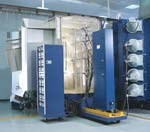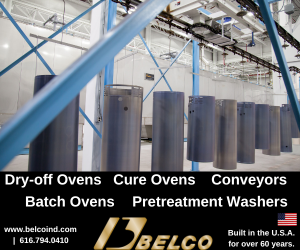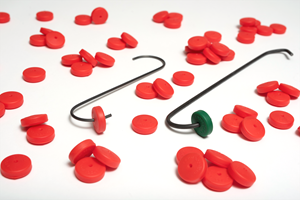Automatic Powder Coating—Meeting Customers' Demands
Increased demand was pushing Royston's powder coating line to maximum capacity, amplifying the problems with the company's aging line. But, an automatic powder coating system relieved the pressure on the line and helped the company meet its customers' demands . . .
Stressful situations tend to exacerbate an individual's faults. Take a golfer, for example. When playing alone or on the driving range, most golfers tend to make more technically sound and efficient swings that lead to better shots. However, in the heat of competition, most golfers tighten up. The stressful situation causes the golfer to revert to old swing faults that result in poor shots. You can see this phenomenon virtually every week (at least when Tiger Woods is not playing) on the PGA Tour when a relatively inexperienced player gets near the lead.
When finishing lines are pushed toward maximum capacity, they often operate like a golfer under stress. If the line is running at a given capacity, one that is not too taxing for the system's capabilities, you may not notice any faults. Perhaps you're coating at 3 mils instead of 2 mils, but at the given capacity the problem isn't that great. But, as the capacity increases and the finishing system is stressed, that 1 mil difference in coating thickness is multiplied. Instead of costing the company a few thousand dollars, the increased coating thickness is now costing the company tens of thousands of dollars.
Good News, Bad News, Good News
Royston LLC (Royston, GA) is a manufacturer of high-quality counters and merchandising systems, including shelves, brackets, grids, inserts, moldings and accessories, that are designed to make convenience stores more convenient.
Following the trend of the general economy, the demand for the company's merchandising systems increased dramatically during the 1990s. As demand increased because of a number of new customers, the number of colors that Royston needed to spray increased as well.
For much of the decade, the company's powder coating system served it quite well. But, as the system was asked to handle an ever-increasing workload, the company realized that its aging powder coating system would no longer be able to keep up with all the new orders.
Jerry Hall, manufacturing engineering manager at Royston, explained that the existing powder coating system was simply too old and too inefficient to meet the increased demand and added colors. "We were definitely experiencing the strains of growth," stated Mr. Hall. "Most of the strain was coming from our powder coating operation. Inconsistent powder coating coverage required excessive manual touchups, and slow color changes caused slow-downs and bottlenecks. Powder losses caused by poor recovery and contamination exceeded 100 lb/day."
The good news of the company's increased business was counteracted by the bad news of its inadequate powder coating system. However, in July 1999, after 2 years of evaluation that included four facility tours and lab tests, Royston received more good news. It came in the form of an automatic powder coating system specially engineered for fast, efficient, contamination-free reclaim in multiple color finishing applications. "We wanted to install the best system possible," said Mr. Hall. "One that would allow us to become more diversified with regard to part sizes and color options and remain flexible into the foreseeable future. We chose Nordson as our supplier for a variety of reasons, not the least of which was the performance of its powder spray systems. We were also comfortable with the company based on our past experience and the knowledge that they would provide the high level of customer service and technical support we were likely to need before and after the sale."
Simply installing a new powder coating booth and some automated spray guns would not have completely removed the stress on the company's existing powder coating system. Therefore, Royston also made the commitment to replace all related systems, including the overhead conveyor and racking system, five-stage cleaning system and bake ovens. "Nordson worked closely with us and our other equipment and material vendors to design and install the optimal system and to train our personnel to operate the new technology. As a result, we were able to deploy a staged conversion, replacing one system at a time without shutting down and with virtually no loss in productivity," proclaimed Mr. Hall.
Meeting the Demands
Two Cyclo-Kinetic® roll-on/roll-off powder coating spray booths are the central piece of the new powder coating system. Each booth is equipped with 14 opposing Versa-Spray® II automatic guns and two Sure Coat® guns for penetration into Faraday cage areas.
Depending on the size and shape of the parts, the new system can powder coat up to 1,200 parts per hour with a reject rate less than 1%. And a single shift of five workers can now handle three full shifts of manufacturing.
Even though the new system runs at faster line speeds to accommodate the increase in demand, Royston has realized a more consistent film build that has significantly reduced powder use. "With the old system, mil thickness could range from 1-4 mils on a single part," stated Ted McCutchen, production supervisor at Royston. "The system gives us a controllable, consistent thickness of 1.5-2.0 mils from the top to the bottom of every part."
In addition to meeting the increased production levels, the new powder coating system has also enabled Royston to handle the increased number of colors needed to satisfy its customers' demands. The previous process typically required 4 hr of cleaning and preparation to change colors. Not only was the time to change colors too long, but Royston also estimated that it was losing 120 lb of powder to scrap on a daily basis, including 30-40 lb that were sprayed to waste. Atanaverage cost of $3/lb, powder loss alone was costing the company $75,000-100,000/yr.
With the new spray booths, the company is able to change colors in the offline booth in an average of 1 hr and reclaim multiple colors with efficiencies as high as 98.5%. Spray-to-waste is eliminated, reducing Royston's overall powder-to-scrap to less than 25% of previous levels.
The roll-on, roll-off system enables the company to change colors six or more times a day. Six of the seven portable hoppers are dedicated to its most common colors, while the seventh hopper is used for frequent color changes. "In addition, we maintain a small stationary booth in which we manually coat smaller batches," said Mr. McCutchen.
The additional pressures created by the increased demand for the company's product and the additional colors have been alleviated, making the new powder coating system a model of efficiency. From rack to unload, parts now travel 2,220 ft in 2 hr prior to being assembled or packaged and shipped to customers for on-site assembly.
According to Richard Edenfield, director of engineering at Royston, the new operation has exceeded the company's expectations. "The technology is more advanced and better supported than any other we have used," said Mr. Edenfield. "In less than a year, we've gone from running a ‘light' booth and a ‘dark' booth that severely restricted our ability to diversify, to an advanced system that enables us to produce as many parts in as many colors as we choose on any given day. That's the level of flexibility we were looking for. To produce a high quality product—which is what your reputation is about—you need high quality equipment and high quality service."
Related Content
Maximize Your Racking Efficiency and Quality
Best practices for racking parts in surface finishing operations.
Read MoreFABTECH 2024 Heads to Orlando
CCAI’s FINISHING Pavilion and Conference continues to grow at FABTECH, offering insights and innovations covering all aspects of industrial surface finishing.
Read MoreTroubleshooting 5 Common Racking Problems for Platers
Being aware of usual issues that might occur during the plating process will prepare platers by helping them know how to avoid them all together or how to fix them if they happen.
Read MoreCFS Unveils New Hook Locks Parts Racking Solution
New product from Custom Fabricating & Supplies (CFS) prevents part loss during coating processes.
Read MoreRead Next
Delivering Increased Benefits to Greenhouse Films
Baystar's Borstar technology is helping customers deliver better, more reliable production methods to greenhouse agriculture.
Read MoreEpisode 45: An Interview with Chandler Mancuso, MacDermid Envio Solutions
Chandler Mancuso, technical director with MacDermid Envio discusses updating your wastewater treatment system and implementing materials recycling solutions to increase efficiencies, control costs and reduce environmental impact.
Read MoreA ‘Clean’ Agenda Offers Unique Presentations in Chicago
The 2024 Parts Cleaning Conference, co-located with the International Manufacturing Technology Show, includes presentations by several speakers who are new to the conference and topics that have not been covered in past editions of this event.
Read More
.JPG;width=70;height=70;mode=crop)











.jpg;maxWidth=300;quality=90)











